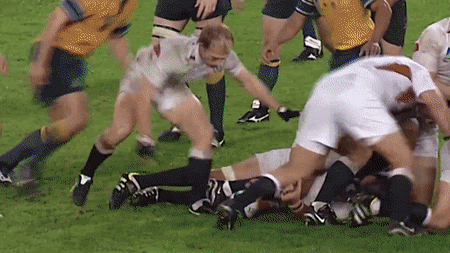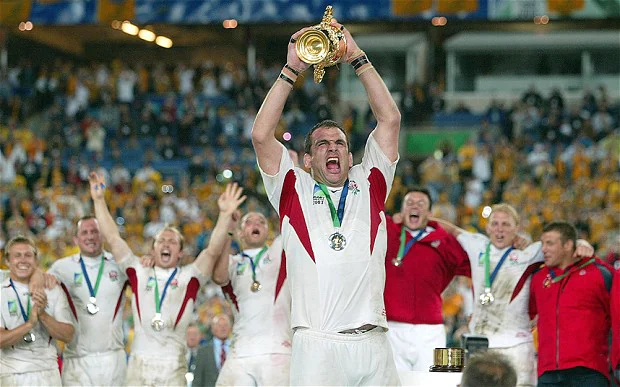The England rugby national team has been a mainstay in rugby circles since the sport was invented just shy of two centuries ago. The Red and Whites are indeed rugby royalty having won the prestigious Triple Crown an impressive 26 times and a record 29 Six Nations titles. The powerhouses have also competed in the highly-touted Rugby World Cup since its inception in 1897, winning the trophy in 2003 and finishing in second place on three separate occasions – 1991, 2001, and 2019. Their 2003 victory remains to be one of if not the most entertaining Rugby World Cup final to date.
How Did England Win Rugby World Cup 2003? England won the Rugby World Cup in 2003 by beating Australia 20-17 after extra time. The match ended 14-14 after regular time. Each side then proceeded to score a penalty in extra time before English rugby legend Jonathan “Jonny” Wilkinson won the match for his side by converting a historic penalty in the dying moments of the hotly-contested fixture.

Birthplace of Rugby
You could quite convincingly argue that the sport of rugby is synonymous with England as it was invented in 1823 at Rugby School in Warwickshire, England when a pupil named William Webb Ellis picked up a ball and proceeded to run with it in his possession. It is after this young pioneer that the Rugby World Cup trophy was named, forever etching his name in the annals of the sport’s history.
Rugby would later become a fully-fledged sport at rugby school in 1845 with the first set of rules being drafted and adopted at the institution by William Arnold, son of the Rugby School headmaster Thomas Arnold alongside two other students – Frederick Hutchins and W. W. Shirley.
In the years that followed, rugby grew in popularity as the students transitioned to institutions of higher learning like universities where they continued to indulge in the sport. By the late 1850s, the sport had already transcended England’s borders to nearby Scotland.
The late 1850s and early 1860s became a defining era for rugby. Particularly after the formation of the Football Association (FA) in 1863 and its subsequent adoption of laws that created the great schism that gave the two sports their own identity by forbidding key elements that were associated with rugby – handling the ball, tackling, hacking (kicking at an opponent’s feet) and restricting a player’s movement by holding them.
Leading the then exodus from the FA was Blackheath Football Club which sparked the creation of hundreds of other rugby clubs over the latter part of that decade culminating in the formation of the Rugby Football Union in 1871.
The rest, as they say, is history as England went on to participate in the first recognized international match in rugby history which in many ways laid the foundation for their national rugby union team.
Years of Disappointment
Having played such a crucial role in the formation and development of rugby and regularly participated in high-level competitions since the early 1880s (the Home Nations Championship that started in 1883), many expected England to register spectacular performances in the Rugby World Cup from its inaugural edition in 1987.
That was however not the case as England first struggled in the pool stages finishing behind Australia before exiting the tournament at the quarter-finals stage after being dismantled by wales 16-3. The Red and Whites drastically improved in their second outing at the Rugby World Cup, beating France and Scotland in the quarter-finals and semifinals respectively before losing to Australia 12-6 in the final.
Despite starting off their 1995 Rugby World Cup campaign on a high note by topping their pool and getting sweet revenge on Australia by knocking them out of the competition at the quarter-finals stage after a hard-fought 25-22 victory, England lost their footing in the semi-finals losing 45-29 to first runners-up New Zealand.
England then appeared to have borrowed from the same script in the 1999 Rugby World Cup as they finished second in their pool before being overwhelmed 44-21 by then-defending Rugby World Cup champions, South Africa, at the quarter-finals stage.

The Buildup
Going into the 2003 Rugby World Cup, England appeared to be on a mission to exorcize the demons that had been haunting their yesteryears in the competition. They started their campaign by topping their pool that included heavy hitters South Africa and Samoa alongside Georgia and Uruguay.
England kept the same momentum in their quarter-finals clash against Wales, who they bested 28-17 in what was a one-sided match where they appeared to be holding back and toying with their Home Nation opponent.
In the semi-finals, England outclassed France 24-7 to comfortably book their ticket to the finals where they would meet that edition’s host, Australia. Fueling England’s stellar performance was its potent blend of youth and experience which overwhelmed their opponents and maintained composure when under fire.
England’s then squad boasted of the likes of William Greenwood, Lewis Moody, Michael Catt, Paul Grayson, wing-full back combo Ian Balshaw, Jason Robinson, Daniel Luger, Stuart Abbott, Owen Lewsey, and expert marksman Jonny Wilkinson.
Trading Blows & The Midas Touch
One final opponent stood between England and glory – that edition’s host Australia. The Wallabies had cost England a golden opportunity in 1991 by outlasting the Red and Whites on their home turf – an outcome that England appeared bent on repaying in kind.
Before a record crowd of just shy of 83000 fans, England and Australia went to war. The hosts drew first blood after ex-winger Lote Tuqiri scored a try in the sixth minute of the match after a temporary lapse of concentration from England’s defense.
After failing to convert the ensuing try, England seized the opportunity five minutes later with the fly-half scoring a penalty to register his side’s first points. Wilkinson scored a second penalty in the 20th minute of the match before scoring his third in the 28th minute.
Wing Jason Robinson then scored the try to give England a commanding 14-5 lead at the end of the first half. Former Aussie coach Edward Jones rallied his troops at the half – a message the hosts took to heart as they made no mistakes defensively allowing fly-half Elton Flatley to score three penalties in the 47th, 61st, and 80th minutes to end the match 14-14 after regular time.
In the subsequent extra time, Wilkinson scored his fourth penalty for England with Flatley responding with a fourth of his own. With only 28 seconds left in the match, Wilkinson scored the title-clinching drop goal in the 100th minute to win England their first and only Rugby World Cup trophy to date making them the only northern hemisphere country to achieve the feat.
